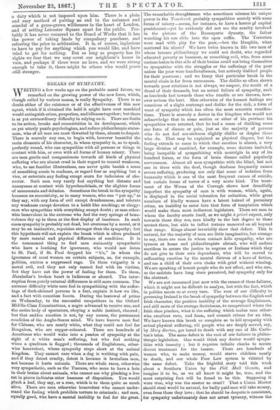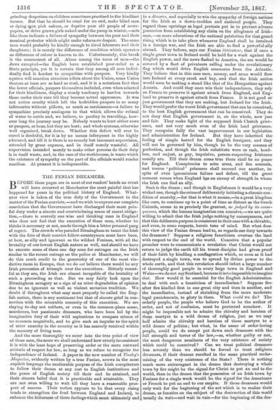BREAKS OF SYMPATHY.
WRITING a few weeks ago on the probable moral future, we remarked on the growing power of the new force, which, though called by various names, is really Sympathy. There is no doubt either of the existence or of the effectiveness of this new agent, which if it obtained the hold it might have over mankind would extinguish crime, pauperism, and idleness together; but there
is as yet extraordinary difficulty in relying on it. There are limits to its action, breaks and eccentricities in its development, which as yet utterly puzzle psychologists, and reduce philanthropic states- men, who of all men are most thwarted by them, almost to despair. There is scarcely any one, to begin with, however beautiful the main elements of his character, in whom sympathy is, so to speak, perfectly round, who can sympathize with all persons or things in
-contact with him, or even with all forms of human misery. There are men gentle and compassionate towards all kinds of physical -suffering who are almost creel in their regard to mental weakness, who, to use familiar illustrations, can never quite banish a sense -of something comic in madness, or regard fear as anything but a vice, or entertain any feeling except scorn for indecision of cha- racter. Such men very rarely feel anything but distaste and annoyance at contact with hypochondristais, or the slighter forms -of monomania and delusion. Sometimes the break in the sympathy becomes an eccentricity, as in many women, who can "put up," as they say, with any form of evil except drunkenness, and tolerate any weakness except devotion to a habit like smoking; or clergy- men who sympathize with everything except doubt ; or men other- wise benevolent in the extreme who feel the very springs of bene- volence dry up in them at the first display of insolence. In such .cases sympathy is probably not dead, but overcome by a moral, or it may be an instinctive, repulsion stronger than the sympathy; but this hypothesis will not explain the break which is often produced by mere mental and physical difference of condition. It is the commonest thing to find men eminently sympathetic who have a loathing for ignorance, who would not listen to St. Paul, if St. Paul dropped his " h's," in whom the ignorance of most women on certain subjects, as, for example, politics, excites a suppressed rage. To them vulgarity is a moral evil, and they not only cannot feel with its victims, but they have not the power of feeling for them. To them, Harabellar's broken heart is ludierous or absurd. The inter- ruption from purely external differences is still more common. The -extreme difficulty white men feel in sympathizing with the suffer- ings of dark-skinned persons is a fact, explain it how we like, and a fact with countless facets. During the bestowal of prizes on Wednesday, to the successful competitors in the Oxford Middle-Class Examinations, a negro advanced to receive one, and the entire body of spectators, obeying a noble instinct, cheered ; but that sudden emotion is not, by any means, the permanent -condition of the Anglo-Saxon mind. We have known men feel for Chinese, who are nearly white, what they could not feel for Bengalees, who are copper-coloured. There are hundreds of Americans who would wake into a passion of sympathy at the sight of a white man's suffering, but who feel nothing -when a quadroon is flogged ; thousands of Englishmen, other- wise benevolent, whose sympathy stops short at the animal kingdom. They cannot care when a dog is writhing with pain, and if they detest cruelty, detest it because it brutalizes men, not because it hurts animals. There are whole races, otherwise very sympathetic, such as the Tuscans, who seem to have a hole in their brains about animals, who cannot see why plucking a live rat in pieces indicates utter baseness of disposition. You would pluck a leaf, they say, or a rose, which is to them quite as much alive. There are men otherwise benevolent who cannot under- stand the feeling which prohibits torture to criminals ; and men, equally good, who have a mental inability to feel for the great. The remarkable draughtaman who sometimes misuses his unique power in the Tomahawk probably sympathizes acutely with some forms of misery—seems, for instance, to have a horror pf capital punishment—yet he evidently did not see the cruelty involved in the picture of the Buonaparte dynasty, the father watching his son slide into the open coffin. The Terrorists were mad with pity for the poor,—but the Dauphin, what mattered his ulcers? We have twice known in life two men of whose intense philanthropy we could not doubt, who regarded educated poverty as baseness, as something evil, who, from some curious lesion in this side of their brains could not bring themselves to sympathize with the struggles or the sufferings of the poor unless the poor were handicraftsmen, but actively disliked people for their poorness ; and we fancy that particular break in the mental chain is far from uncommon. The dislike so often shown towards poor relations is not always, we suspect, the result of a dread of their demands, but an actual failure of sympathy, such as hundreds feel towards those who tumble or are thrown, how- ever serious the hurt. Men otherwise of the keenest feelings are conscious of a slight contempt and dislike for the sick, a form of want of sympathy which has often the most eccentric ramifica- tions. There is scarcely a doctor in the kingdom who would not acknowledge that in some section or other of his province his sympathies were arrested, that he had a sense of disliking some one form of disease or pain, just as the majority of persons who do not feel sea-sickness slightly dislike or despise those who do. That may be explained as physical disgust, but the feeling extends to cases in which that emotion is absent, a very large division of mankind, for example, some doctors included, being incapable of sympathizing with neuralgia in any of its hundred forms, or the form of brain disease called popularly nervousness. Almost all men sympathize with the blind, but not one in three with the deaf, though deafness frequently causes severe suffering, producing not only that sense of isolation from humanity which is one of the most frequent causes of suicide, but certain forms of terror of a very acute kind. The treat- ment of the Wrens of the Curragh shows how dreadfully imperfect the sympathy of men is with women, which, again, is displayed in the social toleration for seduction, while great numbers of kindly women have a latent hatred of pecuniary crime, an inability to enter into that form of temptation which would make them most indiscreet legislators. There are men in whom the faculty exerts itself, as we might d primi expect, only towards those they see, men kindly to the last degree to those around them, but able to inflict torture unmoved on all beyond that range. Kings almost invariably show that defect. This is natural, for the majority of men are little imaginative, but strange to say, there are men in whom contact kills sympathy, who are tyrants at home and philanthropists abroad, who will endure sacrifices to secure the justice to negroes or Italians which they do not give to their own dependents, who will be moved to suffocating emotion by the mental distress of a hero of fiction, and see a child of their own choke with grief without wincing. We are speaking of honest people who do not affect, and who can, as the satirists have long since perceived, feel sympathy only for the abstract.
We are not concerned just now with the causes of these failures, which it might not be difficult to analyze, but with the fact, which in politics meets us at every turn. The root of our difficulty in governing Ireland is the break of sympathy between the English and Irish character, the positive inability of the average Englishman, and still more of the average Scotchman, to comprehend where the Irish shoe pinches, what is the suffering which makes men other- wise excellent rave, and foam, and commit crimes for an idea. We have known this break so complete as to kill sympathy with
actual physical suffering, till people who are deeply moved, say, by Mary Barton, get bored to death with any one of Mr. Carle-
ton's tales. The same defect is the root of our failures in philan- thropic legislation. One would think any doctor would sympa- thize with insanity ; but it requires infinite checks to secure decent treatment for the insane. There are hundreds of women who, to make money, would starve children nearly to death, and our whole Poor Law system is vitiated by the same defect. Take the frightful story told this week
about a Southern Union by the Pa. ll Mall Gazette, and imagine it to be, as we all know it might be, true, and the
most surprising fact will be found to be this. Supposing it were true, why was the master so cruel? That a Union Master should steal would be natural, for badly paid men will take money, even from those they love ; that he should be despotic is consistent, for sympathy unfortunately does not arrest tyranny, witness the
grinding despotism on children sometimes practised in the kindliest houses. But that he should be cruel for no end, make blind men or dying %en pick oakum, or deprive poor old people of news- papers, or drive grown girls naked under the pump in winter,—acts like these indicate a failure of sympathy between the poor and their nominal protector which might make reformers despair. The same men would probably be kindly enough to hired labourers and their daughters ; it is merely the difference of condition which operates as difference of colour is known to do. Unfortunately, this break is the commonest of all. Alone among the races of men—the Jews excepted—the English have established poor-relief as a State principle, yet it is certain that they among all men indivi- dually find it hardest to sympathize with paupers. Very kindly squires will sanction atrocious edicts about the Union, some Union doctors at least are as hard as steel, and it is a notorious fact that the lower officials, paupers themselves included, even when selected for their kindliness, display a steady tendency to harden towards those under their care till they become actual oppressors. It was not active cruelty which left the bedridden paupers in so many infirmaries without pillows, so much as carelessness—a failure to sympathize precisely analogous to that which allows the refusal of water to cattle and, we believe, to poultry in travelling, how- ever long the journey may be. Nobody wants to hurt either cows or paupers, or hens, but they are hurt; and whole systems, otherwise well organized, break down. Whether this defect will ever be cured is doubtful, for it is by no means infrequent in the highly educated, and till it is there is no remedy but incessant supervision, attended by great expense, and in itself merely wasteful. All supervision intended merely to make other persons do their duty is in itself waste, and, in the case of the workhouses, is waste which the existence of sympathy on the part of the officials would render needless. At present it is indispensable.



































 Previous page
Previous page